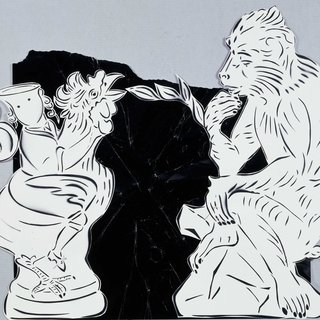About The Work
In Ape Contemplating Wandering Jew, Patkin explores a recurring subject in his work: Judenporzellan, which were cheap and kitsch ceramic works from King Frederick II of Prussia’s Royal Porcelain factory. By a 1769 edict, all Jews were required to purchase Judenporzellan in order to receive permits for any kind of business activity. He uses the history of the Mendelssohn family, a cultured and prominent family involved with the arts and philosophy, as the characters to delve into this little-known episode in Jewish history. In order to conduct business, the Mendelssohn patriarch, Moses Mendelssohn, involuntarily became the owner of 20 porcelain monkeys. In Patkin’s portraits and still lifes, he includes the Judenporzellan to draw attention to the abundant contradictions and examples of anti-Semitism in history. Both the country boy riding a rooster as well as the monkey sitting on a stone are common subjects in Judenporzellan, which Patkin has rendered using a folkloric paper-cut technique.
Courtesy of the Jewish Museum
About Izhar Patkin
Individually stenciled chrome-coated paper collage from a limited edition series of unique works produced by the artist
29.00 x 37.25 in
73.7 x 94.6 cm
This work is signed and numbered.
About The Work
In Ape Contemplating Wandering Jew, Patkin explores a recurring subject in his work: Judenporzellan, which were cheap and kitsch ceramic works from King Frederick II of Prussia’s Royal Porcelain factory. By a 1769 edict, all Jews were required to purchase Judenporzellan in order to receive permits for any kind of business activity. He uses the history of the Mendelssohn family, a cultured and prominent family involved with the arts and philosophy, as the characters to delve into this little-known episode in Jewish history. In order to conduct business, the Mendelssohn patriarch, Moses Mendelssohn, involuntarily became the owner of 20 porcelain monkeys. In Patkin’s portraits and still lifes, he includes the Judenporzellan to draw attention to the abundant contradictions and examples of anti-Semitism in history. Both the country boy riding a rooster as well as the monkey sitting on a stone are common subjects in Judenporzellan, which Patkin has rendered using a folkloric paper-cut technique.
Courtesy of the Jewish Museum
About Izhar Patkin
- Ships in 10 to 14 business days from New York.
- This work is final sale and not eligible for return.
- Questions about this work?
- Interested in other works by this artist or other artists? We will source them for you.
- Want to pay in installments?
Contact an Artspace Advisor
advisor@artspace.com























